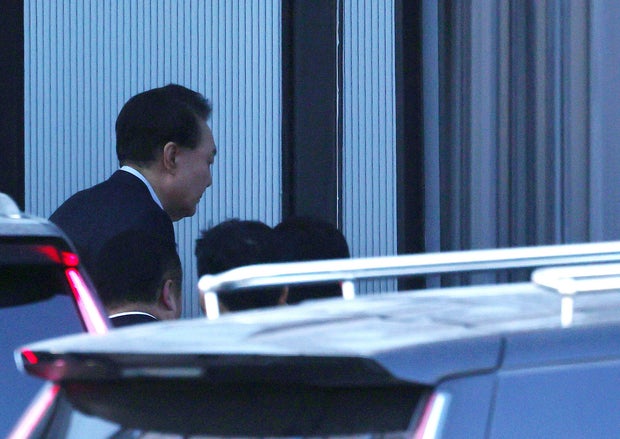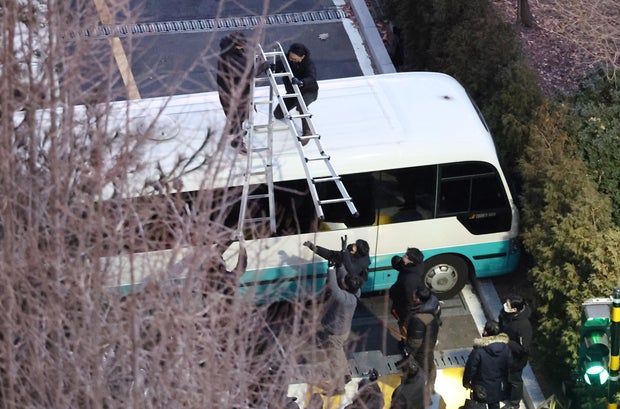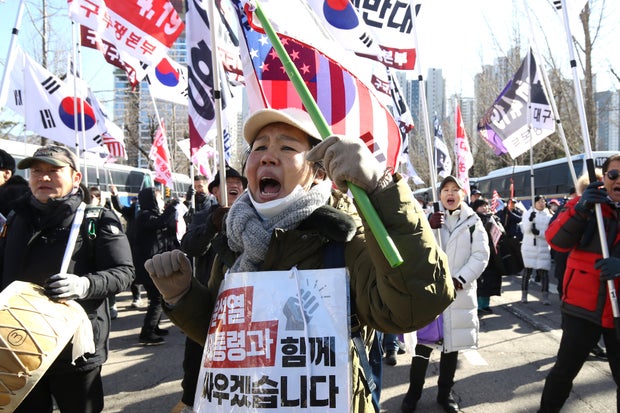Seoul, South Korea — Impeached South Korean President Yoon Suk Yeol was arrested Wednesday in a massive law enforcement raid on the presidential compound, insisting the anti-corruption agency did not have the power to investigate his actions, but saying he complied to prevent violence.
In a recorded video message before being escorted to the anti-graft agency’s headquarters, Yoon lamented that “the rule of law has completely collapsed in this country.”
Yoon, the country’s first sitting president to be apprehended, had been holed up for weeks in the Hannam-dong residence in the capital, Seoul, while vowing to “fight to the end” to oust him. He justified his brief declaration of martial law on December 3 as a legitimate act of governance against an “anti-state” opposition using its legislative majority to thwart its program.
Korean Pool/Getty
The Senior Officials Corruption Investigation Bureau said Yoon was arrested about five hours after investigators arrived at the presidential compound and about three hours after they managed to enter the residence, in their second attempt to stop him following the imposition of martial law.
A series of black SUVs, some equipped with sirens, were seen leaving the presidential compound under police escort. Yoon was later seen getting out of a vehicle after arriving at the agency’s office in the nearby city of Gwacheon. After the interrogation, Yoon was to be sent to a detention center in Uiwang, near Seoul.
Yoon could be detained for weeks.
The anti-graft agency, which is conducting a joint investigation with the police and military to determine whether Yoon’s declaration of martial law amounts to an attempted rebellion, has 48 hours to seek a court order for a formal arrest under the charge of attempted rebellion. and if he fails, Yoon will be released. If Yoon is formally arrested, investigators may extend his detention for up to 20 days before transferring the case to prosecutors for charging.
The anti-corruption agency told reporters that Yoon, during his first two hours of questioning, exercised his right to remain silent.
The arrest warrant for Yoon, issued by the Seoul West District Court, says there is substantial reason to suspect he committed crimes as a “rebellion leader.”
Yoon’s presidential powers were suspended when Parliament impeached him on December 14. The impeachment case now rests with the Constitutional Court, which could formally remove Yoon from office or dismiss the case and reinstate him.
In another post on his Facebook account after his arrest, Yoon asserted that “martial law is not a crime,” saying his statement was necessary to raise awareness about an opposition that exercised “a legislative dictatorship in blocking laws and budgets” and “paralyzing” state affairs. He denied the accusations of rebellion, calling his indictment a “fraud.”
As they began the arrest operation early in the morning, anti-corruption investigators and police officers clashed for hours at the entrance to the complex with presidential security forces, but encountered no significant resistance. .
YONHAP NEWS AGENCY/Reuters
Police officers were seen using wire cutters to remove barbed wire placed by presidential security services around the perimeter of the compound to block their entry. Some officers used ladders to scale rows of buses placed by presidential security near the entrance to the compound, then investigators began climbing the hilly compound. Investigators and police then arrived at a metal gate bearing a golden presidential mark, located near Yoon’s residential building. Some police officers were seen walking through a security door at the side of the metal gate, joined by one of Yoon’s lawyers and his chief of staff. Presidential security then removed a bus and other vehicles that were parked inside the gate as a barricade.
Despite a court warrant for Yoon’s arrest, presidential security insisted they were obligated to protect the deposed president and fortified the compound with barbed wire and rows of buses blocking passageways.
South Korea’s acting leader, Vice Prime Minister Choi Sang-mok, issued a statement on Wednesday calling on law enforcement and presidential security services to ensure that there are no “physical confrontations”.
After Yoon’s arrest, Choi met with diplomats from the Group of Seven, including the United States, Japan, Britain and Germany, as well as the representative of the European Union, to reassure them about the stable functioning of government.
Park Chan-dae, leader of the liberal opposition Democratic Party, which led the legislative campaign that led to Yoon’s impeachment on Dec. 14, said Yoon’s detention was “the first step toward restoring constitutional order, democracy and the achievement of the rule of law”. “.
As investigators moved up the hillside compound, lawmakers from Yoon’s People Power Party held a rally in nearby streets, denouncing efforts to stop him as illegal.
The National Police Agency has met with field commanders in Seoul and neighboring Gyeonggi Province in recent days to plan their arrest efforts, and the size of those forces has fueled speculation that more than one a thousand officers could be deployed. The agency and the police had openly warned that presidential bodyguards who obstructed the execution of the arrest warrant could be arrested.
Yoon’s lawyers argued that the detention warrant issued by the Seoul West District Court was invalid. They cited a law that protects places potentially linked to military secrets from searches without the consent of the person responsible – believed to be Yoon. They also claimed the anti-corruption agency had no legal authority to investigate allegations of rebellion.
“I am truly appalled to see illegalities upon illegalities upon illegalities and proceedings forcefully carried out under an invalid warrant,” Yoon said in the video released before his detention. “I do not recognize the investigation carried out by the Bureau of Investigation into Senior Officials Corruption. As President, responsible for upholding the constitution and legal system of the Republic of Korea, my decision to comply with such illegal and invalid procedures is not an acknowledgment of them, but rather a desire to prevent unfortunate and bloody incidents. »
Chung Sung-Jun/Getty
Yoon’s supporters and critics staged competing protests near the residence – some vowing to protect him, others calling for his imprisonment – as thousands of police in yellow jackets closely monitored the tense situation.
Yoon declared martial law and deployed troops around the National Assembly on December 3. It only lasted a few hours before lawmakers managed to circumvent the blockade and vote to lift the measure. The opposition-led assembly voted to impeach him for rebellion on December 14.
The Constitutional Court held its first formal hearing in the impeachment case on Tuesday, but the session lasted less than five minutes because Yoon refused to attend. The next hearing is set for Thursday and the court will then continue the trial whether Yoon is present or not.
The White House National Security Council issued a statement saying the United States maintains its support for the Korean people and “our shared commitment to the rule of law.” Washington remains committed to working with the government led by Seoul’s interim leader Choi and reaffirms the strength of the alliance between the two countries.











